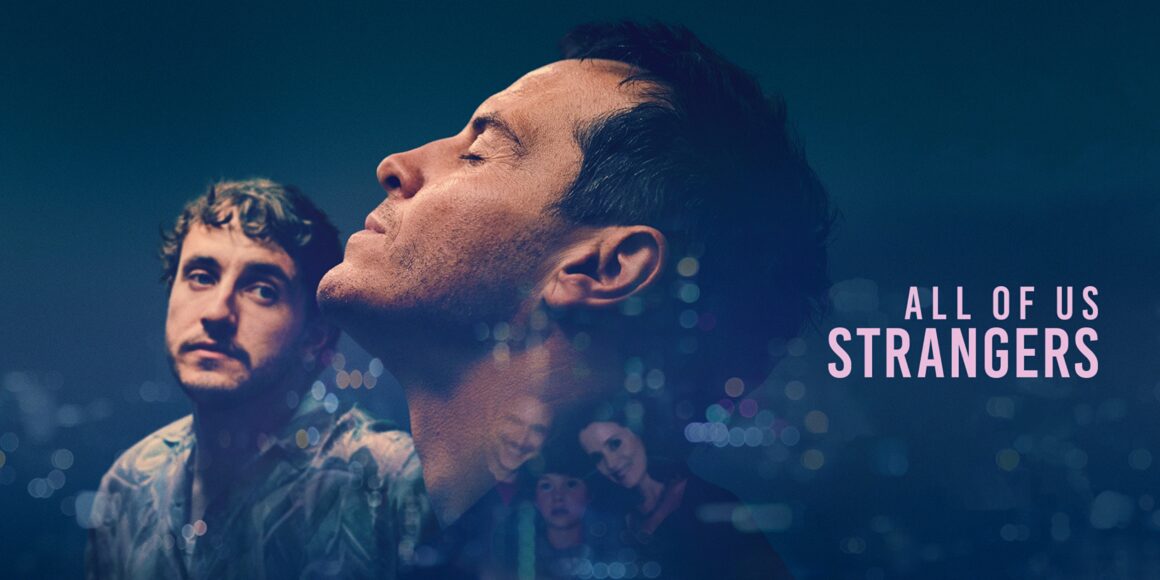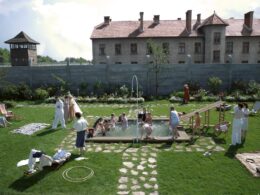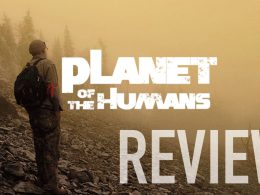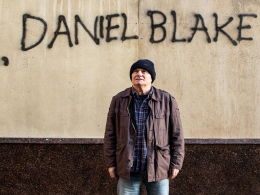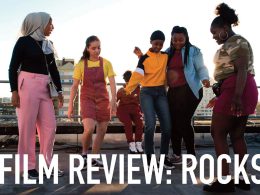All of Us Strangers
directed by Andrew Haigh
Searchlight Pictures, 2024
By Michael Shiel
Based on the novel Strangers by Taichi Yamada but given a new title, there is something universal about All of Us Strangers. It looks at loneliness and longing, and how fantasy can reconcile the problems of our past, while love and real connection with others can free us from our isolation. But as this unbearably moving film shows, this freedom can be fleeting.
Andrew Scott plays Adam, a screenwriter living alone in a near-empty apartment block outside central London. The film opens with his face glowing orange, reflected on the distant blue city skyline, while an orange light on the horizon absorbs and dazzles the entire frame as the title appears. There is a part of him that is lost, impossibly distant, but in this film we see him search for this lost self in his fantasies and become dazzled by them.
Adam has felt lonely his whole life, with only faraway dreams of connection. Even when he goes out we barely see anyone around him. His friends have moved out of the city to have a place with “a garden for their kids”, something he feels no connection with. Growing up gay in the 1980s, he was bullied and taught to be ashamed of himself, and marriage wasn’t legally possible for most of his life.
Even though he thinks things have gotten better, he says it “doesn’t take much to make you feel the way you felt,” because homophobia continues to shape his life. Andrew Scott is brilliant and understated as someone who has learned to hide his self-expression and live without believing that the life he wants is possible. He is quiet, hesitant and unsure in expressing his needs. He lives in the past, sifting through old family photos and listening to music from his childhood. Throughout the film he visits his childhood home and speaks to the spirits of his dead parents. He does this while dressed in his childhood clothes even as his parents speak to him as an adult.
These fantasies teach us who Adam is. He retreats to the comfort of the time when his parents were alive, but even his fantasy version of the past is filled with discomfort. He comes out to them both as gay (“as in homosexual?”) and has to fight against the stereotypes his parents have been taught in their upbringing, assuring them that things are better now. But the ‘lonely gay man’ stereotype is one he can’t escape because of how oppression of queer people has decided his life for him. In these fantasies, his parents accept him. They apologise for not understanding him and not giving him the help they didn’t know he needed, and he has the freedom to tell them the things he couldn’t articulate as a child while fixing his relationship with them.
Generational changes around attitudes to queer life are expressed through the terms people use. Adam uses the term ‘gay’, his mother uses ‘homosexual’ and ‘queer’ is used by Adam’s lover Harry, played by Paul Mescal. Harry is the only other person Adam sees living in his apartment complex. He is more forthright and open about his sexuality than Adam. There is a generational difference here (Adam associates ‘queer’ with its use as an insult and ‘gay’ is the term he uses more comfortably, while for Harry it seems to be the other way around), but none of this stops their connection. Harry’s parents have hesitatingly accepted him, but like Adam he is alone, and while Harry’s siblings are married with kids he feels like someone on the edge of the family.
When Adam asks Harry why he thinks that’s okay, Harry says “Because I don’t go home much.” Modern capitalist life has worn down communal bonds and individualised social relations, offering romantic love and the model of the nuclear family as the incomplete replacement for this deeply alienating condition. But not everyone has a family, not all families are places of comfort and connection and, especially for queer people such as Harry and Adam, the oppression that comes with this system makes even meaningful relationships extremely precarious.
In spite of all of this, human bonds persevere. Adam and Harry, through love, build each other back up. They talk about gay life with a frankness rarely seen in films, and Adam comes to terms with his past. In one scene, Harry comforts Adam after hearing about his parents’ death. Adam shyly sidesteps saying it “happened a long time ago.” Harry says that it doesn’t matter. They help each other see the barriers they’ve built up, but when they’re together these barriers melt away. Sadness pervades the film, made worse by the promise of relief not being fully met, but there is joy and love too, and the tension between moments of hope and despair are incredibly powerful to watch.
Inside this tragic story of modern queer life, there is a dream of a world with true community and reconciliation with our loved ones, where we understand ourselves through knowing one another. As the final shot of the film shows, all of us are strangers, forced apart but ultimately pulled together by our need for connection. But we may not be strangers forever.





